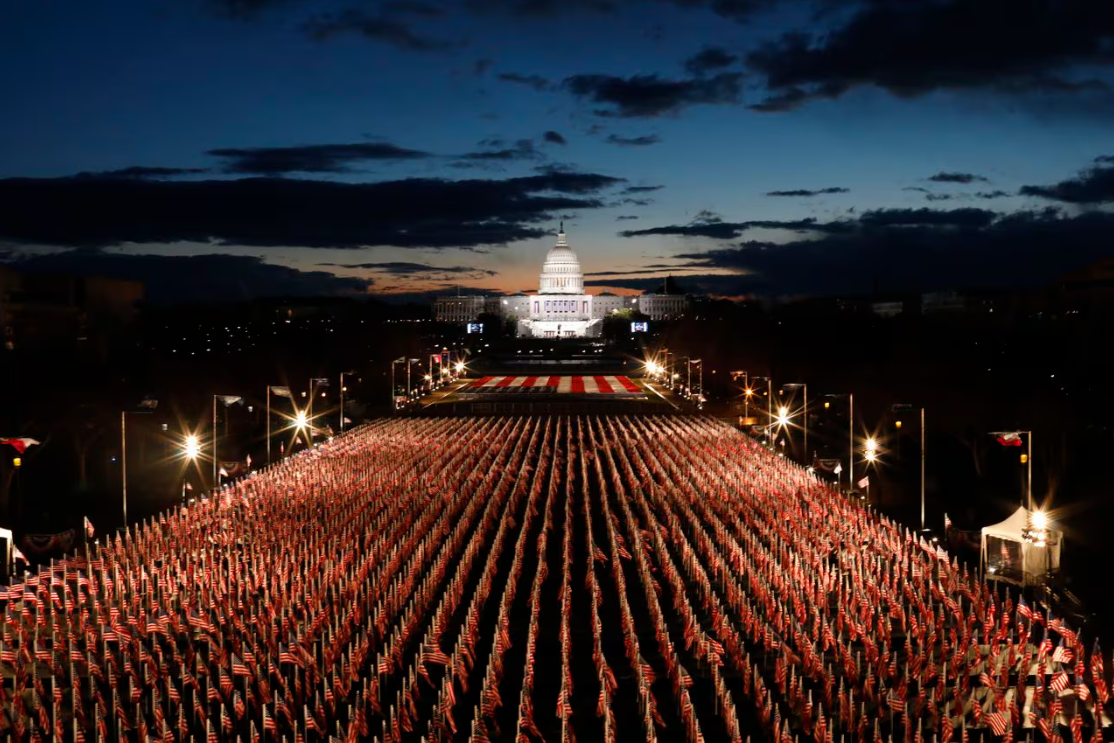大流行病如何塑造美国政治

【中美创新时报2024年3月25日讯】(记者温友平编译)当这两个人再次参选时,COVID-19 作为一股社会和政治力量悄然存在。尽管疫情有所减弱,但它已成为总统竞选活动的背景音乐,塑造了选民对国家、政府及其政治的看法。《纽约时报》记者丽莎·勒勒(Lisa Lerer)和詹妮弗·梅迪纳(Jennifer Medina)对此作了下述报道。
2020年3月,当乔·拜登和唐纳德·特朗普首次角逐白宫时,美国生活变得几乎面目全非。致命病毒和公共卫生封锁以惊人的速度改变了日常生活,让该国几乎没有时间做好准备。
四年后,冠状病毒大流行已基本上从公众的注意力中消失,并且在竞选活动中很少受到讨论。 然而,当这两个人再次参选时,COVID-19 作为一股社会和政治力量悄然存在。尽管疫情有所减弱,但它已成为总统竞选活动的背景音乐,塑造了选民对国家、政府及其政治的看法。
在大流行之后的调查中,公众对总统、公立学校、刑事司法系统、新闻媒体、国会等机构的信心大幅下降,而且尚未恢复。 这场大流行加剧了选民对政府的不信任,特朗普和他的盟友正在利用这种情绪来谋利。对政治暴力甚至内战的担忧达到历史最高水平,而国家幸福指数则创下历史新低。尽管该国已经摆脱了经济衰退的预期,但人们对国家经济的看法和对未来的信心仍然黯淡。
纽约州州长、民主党人凯西·霍赫尔 (Kathy Hochul) 在接受采访时表示:“这场流行病让人们失去了信心——你从来没有像现在这样安全过。” “我们开始恢复正常。但我认为人们很难再次感觉良好。”
民选官员、战略家、历史学家和社会学家表示,这一流行病的持久影响在今天有关通货膨胀、教育、公共卫生、大学债务、犯罪和对美国民主本身的信任的辩论中显而易见。他们说,挥之不去的创伤正在加剧选民在民意调查和焦点小组中表达的一种全国性的不适感——一种流行病的后遗症,似乎正在伤害拜登并帮助特朗普在总统大选中重战。
拜登政府通过了一系列强有力的立法,并发布了行政行动,帮助国家摆脱了危机,但选民对总统的成就给予有限的认可,并对经济和国家的方向仍然持悲观态度。特朗普经历了疫情最严重的阶段,但他自诩为一个更加繁荣和安全的国家,并在民意调查中继续领先拜登。
担任调查 9 月 11 日恐怖袭击委员会执行主任的律师菲利普·D·泽利科 (Philip D. Zelikow) 表示,拜登政府行动太快,未能将疫情抛在脑后。
泽利科表示:“由于拜登政府从未对这场危机进行过调查,而且拜登政府也从未制定出一套严肃的改革方案来应对危机,因此政府基本上给人留下的印象是,它承认政府失败了。” ,但只是不想再谈论它了。”
泽利科自称是一名政治独立人士,并表示他反对特朗普,他领导了一个由 30 多名专家组成的无党派团队,名为“新冠危机小组”,该小组调查了疫情应对措施,并在一本书《新冠战争的教训》中发表了调查结果。他表示,联邦政府未能解释大流行是如何发生的,加剧了对机构的不信任,这种侵蚀很可能对特朗普有利,特朗普认为美国政治和政府是“被操纵”的系统。
泽利科说:“如果像唐纳德·特朗普这样的人今年秋天当选,政府在新冠危机中的表现将是一个重要原因。”
许多美国人,无论持何种政治观点,都不想重温那个困难而致命的时期。哥伦比亚大学负责记录这一流行病的口述历史项目的瑞安·哈根 (Ryan Hagen) 表示,随着危机的结束,让他的研究参与者继续与研究人员交谈变得很困难。
他说:“在这次选举中,这种流行病无处不在,而不是具体的,因为它为这场竞选活动的展开奠定了条件。” “尽管我们几乎没有人谈论它,但我们都生活在它的阴影下。”
拜登为自己在使国家摆脱严重灾难的过程中所发挥的作用进行了辩护,他在国情咨文中将这一流行病称为“从未讲述过的最伟大的卷土重来的故事”。
拜登的助手表示,竞选团队意识到人们对政府的信任度不断下降,孤立感日益加剧。 他们的大部分外展活动都集中在通过家人、朋友或有影响力的人接触选民,而不是通过总统或传统的政治代理人。
特朗普政府采取了关键步骤,包括援引《国防生产法》,以加速疫苗的开发,使美国人的生活开始恢复某种程度的正常状态。 但特朗普很少讨论这一流行病。 当他这样做时,通常会指责中国造成了这种情况,或者病毒破坏了他提醒观众的强劲经济。 只有小罗伯特·F·肯尼迪(Robert F. Kennedy Jr.)作为独立候选人,以其对疫苗的直言不讳的怀疑和宣扬阴谋论而吸引了一批追随者,作为候选人继续频繁地提出病毒,并经常指控政府腐败。
美国人经历这一代人以来最具全球性破坏性事件的方式截然不同,因此任何有关这场危机的政治讨论都变得复杂起来。
不存在单一统一的流行病叙述。在加利福尼亚州、纽约州和其他民主党控制的州,学校和企业一直维持限制措施直至 2021 年。在佛罗里达州、佐治亚州、南达科他州和其他共和党控制的州,生活恢复正常的速度要快得多,即使死亡人数已经增加 通行费已安装。
从那时起,党派政治就给记忆留下了色彩。去年发表在《自然》杂志上的一项研究发现,人们对大流行严重性的记忆因后来对疫苗的看法而产生了偏差。
纽约大学社会学教授、一本关于纽约疫情的新书《2020:一个 城市、七个人和一切都改变的一年。” “今天我们剩下的就是这种感觉就像这个国家发生了什么事的情感体验。 我们正在经历长期的新冠疫情作为一种社会疾病。”
本文最初发表于《纽约时报》。
题图:2021 年 1 月 20 日,华盛顿,美国国会大厦和国家广场上覆盖着美国国旗,代表那些本来可以参加乔·拜登总统就职典礼的人,如果不是因为冠状病毒大流行而取消了就职典礼。JASON ANDREW/NYT
附原英文报道:
How a pandemic malaise is shaping American politics
By Lisa Lerer and Jennifer Medina New York Times,Updated March 24, 2024
In March 2020, when Joe Biden and Donald Trump competed for the White House for the first time, American life became almost unrecognizable. A deadly virus and a public health lockdown remade daily routines with startling speed, leaving little time for the country to prepare.
Four years later, the coronavirus pandemic has largely receded from public attention and receives little discussion on the campaign trail. And yet, as the same two men run once again, COVID-19 quietly endures as a social and political force. Although diminished, the pandemic has become the background music of the presidential campaign trail, shaping how voters feel about the nation, the government, and their politics.
Public confidence in institutions — the presidency, public schools, the criminal justice system, the news media, Congress — slumped in surveys in the aftermath of the pandemic and has yet to recover. The pandemic hardened voter distrust in government, a sentiment Trump and his allies are using to their advantage. Fears of political violence, even civil war, are at record highs, and rankings of the nation’s happiness at record lows. And views of the nation’s economy and confidence in the future remain bleak, even as the country has defied expectations of a recession.
“The pandemic pulled the rug from people — you were never quite as secure as you were,” Governor Kathy Hochul of New York, a Democrat, said in an interview. “We’re starting to get our grounding back. But I think it’s just hard for people to feel good again.”
Elected officials, strategists, historians, and sociologists say the lasting effects of the pandemic are visible today in the debates over inflation, education, public health, college debt, crime, and trust in American democracy itself. The lingering trauma, they said, is contributing to a sense of national malaise that voters express in polling and focus groups — a kind of pandemic hangover that appears to be hurting Biden and helping Trump in their presidential rematch.
Biden’s administration passed a robust package of legislation and issued executive actions that helped steer the country out of the crisis, but voters give the president limited credit for his accomplishments and remain pessimistic about the economy and the nation’s direction. Trump oversaw the most acute phase of the pandemic, but he casts himself as having presided over a more prosperous and secure country, and continues to lead Biden in polls.
Philip D. Zelikow, the lawyer who served as the executive director of the commission that investigated the Sept. 11 terror attacks, said the Biden administration moved too quickly to put the pandemic behind it.
“Since the Biden administration never conducted an investigation of the crisis,” Zelikow said, “and also the Biden administration never developed a serious package of reforms to react to the crisis, the administration basically left the impression that it accepted that the government had failed, but just didn’t want to talk about it anymore.”
Zelikow, who describes himself as a political independent and says he opposes Trump, led a nonpartisan team of more than 30 experts called the Covid Crisis Group that investigated the pandemic response and published its findings in a book, “Lessons From the Covid War.” He said that the federal government’s failure to explain how the pandemic happened had accelerated distrust in institutions, and that such an erosion would most likely benefit Trump, who argues that US politics and government are “rigged” systems.
“If someone like Donald Trump is elected this fall,” Zelikow said, “the government performance in the COVID crisis will be a significant cause.”
Many Americans, of all political persuasions, do not want to revisit that difficult and deadly period. Ryan Hagen, who runs an oral history project documenting the pandemic at Columbia University, said it became difficult to get the participants in his study to continue speaking to the researchers as the crisis wound down.
“The pandemic is everywhere in general in this election and nowhere specific, because it sets the conditions under which this campaign is unfolding,” he said. “Even though hardly any of us talk about it, we are all living in its shadows.”
Biden has defended his role in pulling the country out of a moment of profound calamity, using his State of the Union address to cast the pandemic as “the greatest comeback story never told.”
Biden aides said the campaign was aware of declining trust in government and of increasing isolation. Much of their outreach is focused on reaching voters through family, friends or influencers, rather than through the president or traditional political surrogates.
The Trump administration took critical steps, including invoking the Defense Production Act, to accelerate the development of the vaccines that allowed American life to begin to reclaim some semblance of normalcy. But Trump discusses the pandemic only infrequently. When he does, it is often to blame China for causing it, or the virus for ruining what he reminds audiences was a strong economy. Only Robert F. Kennedy Jr., the independent candidate who attracted a following with his outspoken skepticism of vaccines and his promotion of conspiracy theories, continues to raise the virus frequently as a candidate, often to make allegations of government corruption.
Any political discussion of the crisis is complicated by the widely different ways Americans experienced the most globally disruptive event in a generation.
There is no single unifying pandemic narrative. In California, New York, and other Democratic-controlled states, schools and businesses maintained restrictions well into 2021. In Florida, Georgia, South Dakota, and other Republican-run states, life resumed some semblance of normalcy far more quickly, even as death tolls mounted.
Since then, memories have been colored by partisan politics. One study published in Nature last year found that people’s recollections of the severity of the pandemic were skewed by the views they later held about vaccines.
“It was the first time in my lifetime that it felt like everything was up for grabs,” said Eric Klinenberg, a professor of sociology at New York University and the author of a new book about the pandemic in New York, “2020: One City, Seven People and the Year Everything Changed.” “Where we’re left today is this emotional experience of feeling like something is off in the country. We’re experiencing long COVID as a social disease.”
This article originally appeared in The New York Times.

